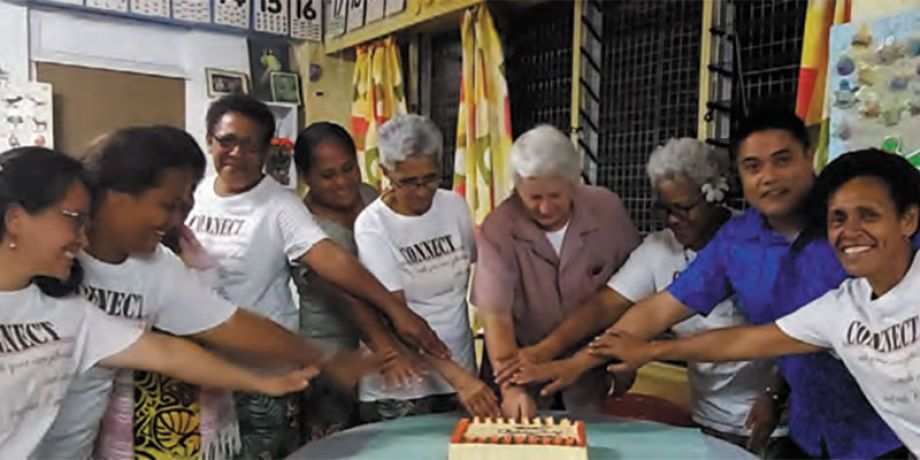
Its Beginning and Name
The Sema Livelihood Program began as a recycling project for the interested women in the parish during the 2019 Season of Creation observation at St. Pius X Parish-Raiwaqa (Fiji). It started with two women coming until it grew its membership to twelve. We used to meet every Tuesday of the week; later we added Thursday. The sessions were then held at the meeting room in the parish. It was filled with chatter and laughter as they learned how to weave their first project—a photo frame—using newspaper tubes. After a few weeks, they moved to weaving baskets and vases using the same recyclable material. After weaving, the product will be painted with two coats of light tan cloth paint. To finish it, it will be glazed with eco-friendly glue to give it a slight shimmer.
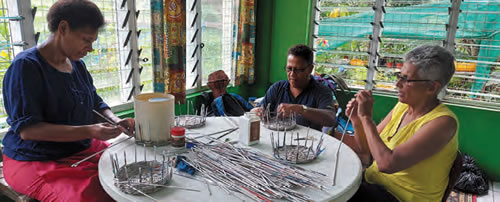
As we were preparing for its formal launching in the parish, we got stuck with how we would name the program. Most of the ladies had trouble in connecting or joining one newspaper tube to another while weaving a basket. When the joining is not properly done, the whole thing collapses, so one would have to start again to where the problem began—connecting tubes. It was because of this that the members unanimously decided to name the program Sema Livelihood Program. “Sema” is a Fijian word, which means, “connect.” As we were discussing this, a member shared her reflection on the chosen name, saying that it is more than just the physical meaning of the word which we do every day. Deeper than connecting newspaper tubes while weaving, the ladies also were able to connect with each other as they share their life stories. They’ve also grown more conscious about the value of caring for creation.
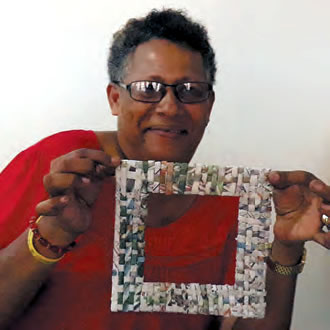
We have now completed establishing its four sub-programs, which are weaving, sewing, urban farming, and cooking. Each sub-program has its own program in-charge to help its development. For their weaving program, they mainly use newspaper tubes to weave photo frames and fruit baskets.
On the other hand, their sewing program makes use of material cuttings (from local tailoring shops) which are sewn into tote bags or shopping bags. For their urban farming program, we have a tiny laboratory garden where they learn how to grow vegetables in the urban setting. This is located at the back of the parish hall. This is where they grow seedlings such as tomatoes, chilies, cabbages, beans, okra, capsicums, marigolds, sunflowers, taro, and passion fruit. On top of that they also make their own compost from scrapped vegetables from the nearby market.
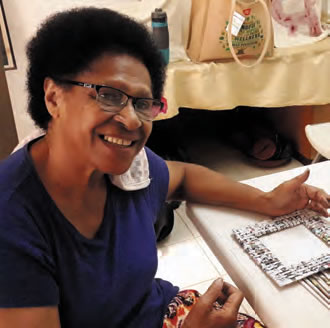
Lastly, the fourth program is cooking. Last July, we had Evangeline “Jinky” Ucol, another Columban lay missionary assigned here in Fiji teach the members a few recipes for desserts and candy.
All of Sema’s four sub-programs aim to provide income-generating ideas for unemployed mothers in the parish of St. Pius X-Raiwaqa. For months now, it is trying to sustain itself through its small sales from the products (baskets, bags, steamed cakes, yema candies, plants, and seedlings) that they sell occasionally. From their first public market, they were able to buy the small things like tables, electric kettles, irons, etc., which they need for when they come for sessions.
Sema was formally launched on International Women’s Day, March 8, 2020. This was done so to show and celebrate the giftedness of women and their strength as persons in the society and in the family.
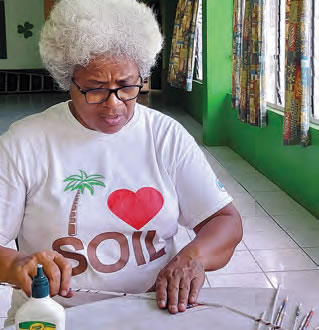
But a couple of weeks after that, COVID-19 hit Fiji marking its first case of border transmission. We had to cancel all parish activities and this included Sema’s weekly sessions. After three weeks of lockdown in the capital, we slowly resumed our sessions. This provided the mothers the avenue to share their experience of lockdown—how they coped with domestic stress like being cramped up in a tiny home with a large number of people in the house, restless school children, etc. And on top of that, they were not able to attend Sunday services. One of them shared, “During the lockdown, the rolling of newspaper tubes and weaving of baskets helped me a lot. It provided me the distraction, and it made me productive.” She was able to weave at least eight baskets.
Another member used the lockdown opportunity to sew more bags; and another concentrated on her own backyard garden. As they were sharing, they were able to show support to one another which tightened their bond. Soon enough, laughter came back in the scene with these strong women. These are some of their stories:
“When I was young I never bothered to learn how to weave even though my mother was an excellent mat weaver. Now that I am at this age, I am learning this skill which is part of my Fijian culture.” –Melika Nabou
“Sema is the place where I come to be me; to share the God-given talent I have and to learn from other women who surprise everyday with their knowledge as they teach and share their passion too. Time seems to go by very fast when we come together on Tuesdays and Thursdays. A smile as we come in the mornings and a wider smile as we leave in the afternoon.” –Cecilia Vatuloka
“I am happy to be given this opportunity with Sema. I get to know and connect with these women individually through sharing life stories, sharing and appreciating our God-given gifts and skills and supporting one another. Finally, the highlight for me would be the dose of laughter when we come together relieves me from stress.” –Maria Qaranivalu “When I heard about this program, I said to myself, ‘Why not give it a try?’ as I was always interested in learning craft work and also learning other life skills. Now, I have never regretted. I get to share with others the skills I learned especially weaving baskets out of old newspapers. I am thankful for this program and I encourage other ladies out there to come and join us. This is one way of making yourself self-reliant, resourceful, and creative.” –Emily Tabua
We began the relationship as women with the same interest in hand craft and then expanded to commitment to care for creation. From the basic skills that were shared, they gradually pitch in their own creativity in making their products. They have grown as their relationship with each other evolved—with compassion and love for one another. The program is not just a livelihood program, but it has also become their own support group whenever they need it. But for me, this is the miracle of five loaves and two fish in action right before my eyes.
Columban lay missionary Marjorie Engcoy lives and works in Fiji.